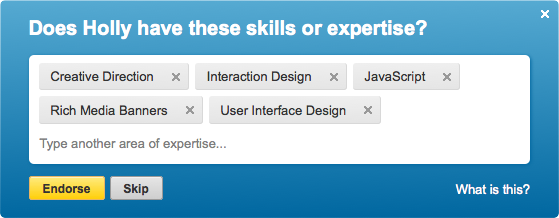Endorsements are a feature that LinkedIn is now trying to push over recommendations. An endorsement when someone says that you have a specific skill. It’s as easy as liking something on Facebook, and LinkedIn is now putting much more emphasis on endorsements than it is on recommendations.
Unfortunately, endorsements, in their current form, are worse than useless. They’re extremely dangerous.
How it works
When you go to someone’s page, and haven’t been there in a while, a box will pop up at the top listing several skills. It will automatically fill that with a list of skills. It essentially asks you if you believe that person has those skills.
Each item has a little X next to it, so you can delete specific skills. You can even add new skills that aren’t listed. Then once you’ve adjusted the list, you can endorse them all at once.
What it doesn’t tell you is that some of those skills are made up!
Essentially, the list of skills at the top includes both specific skills that person has said they have, as well as skills LinkedIn’s algorithms think they’re likely to have. You may find yourself going to someone else’s page and saying, “Oh, I trust them. I’m sure they’re good at all this stuff.” But if you’re looking at the box up top, you’re may be looking at skills they didn’t even enter.
I went to my coworker Holly’s page, and the box popped up. Her box had JavaScript listed. That’s a programming language, and she’s a designer. I double checked with her to make sure she wasn’t hiding her programming talent from me, and she said she’s not proficient in JavaScript.

Of course, if I scroll down to the bottom of her profile, it shows the list of skills she’s entered. I can safely endorse the skills on there, as long as I agree.
Why recommendations are better
With recommendations, you have to actually put a little energy, time, and thought into writing some words. You have to be able to articulate what you think about someone and their skills. So there is more effort involved. Recommendations are fairly useful in providing social proof that someone is well qualified.
Why endorsements are extremely dangerous
Endorsements are so easy to give that they will become worthless. But being easy isn’t enough to make them dangerous.
I only discovered the automatically listed skills through experimentation. Most people don’t know about the made up skills. So people will probably look at my profile and say to themselves, “Oh, I believe Tim. I’m sure he’s a great graphic designer.” Of course, I would never say that. I work with great graphic designers, but am not one myself.
That makes them worse than worthless. It’s far too easy for one individual to endorse another individual for a skill they don’t have.
That will lead to massive amounts of false information on LinkedIn, which makes endorsements extremely dangerous.



TIm, I have been endorsed as a preacher by people who have never heard me preach, so I get what you are saying here. Of course, since I know people have endorsed me that way, and I have heard the same thing from others, endorsements are suspect to me. As you suggest, though, recommendations are more specific, thoughtful, time consuming, and personal. If you really appreciate something somebody has done for you or in your presence, recommend them on their Facebook page, Linkedin, or send them a note and let them know that they can post it where ever they like.
Absolutely agree, Richard. Taking the time to actually write out a recommendation is what really shows you care.
Tim, You make some really good points. I especially appreciate knowing that LinkedIn is making up some of the endorsement options, and that explains some of the weird options I have seen pop up. I wish there was an option for eliminating the endorsement pop-up screen as it is getting annoying! I prefer going to my contact’s actual profile and selecting specific endorsements that I feel confident about.
But, recommendations are much more credible and reliable. I like the completeness and genuineness of full recommendations as you do. I think they hold a lot more weight. But I think that the endorsements that have a lot of support are a pretty strong indicator as well.
Thanks for the great feedback, Lori! I wish the option to disable the pop up was there as well. I suspect endorsements are not going anywhere any time soon, but I wish they would turn off the automatically generated ones.
I noticed that people who just barely knew me were starting to recommend me for skills that weren’t in my resume or in my experiences with them.
I’m just about ready to close down my LinkedIn account, I really haven’t found a good use for it, and now I am suspicious of the data it is publishing.
Understandable. Since LinkedIn is making it so easy for people to endorse skills you never claimed to have, many accounts will probably start having that same issue.
Not a big fan of hyperbole, but I agree with your criticism. I have a similar problem with LIONs – There’s a point where the number of relationships/contacts/friends grows to that the relationships themselves start to become meaningless.
I would like to endorse this article.
Thanks, Tim!